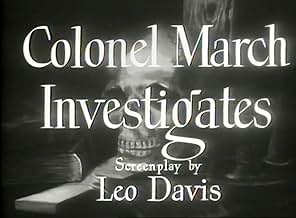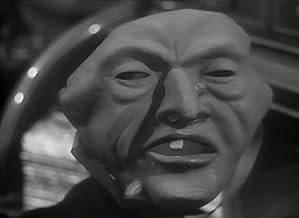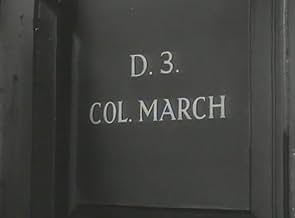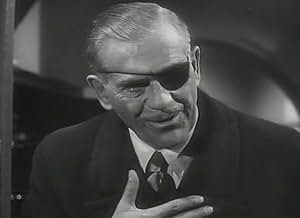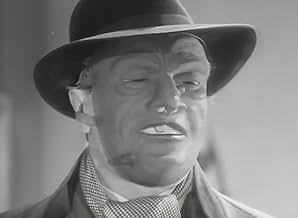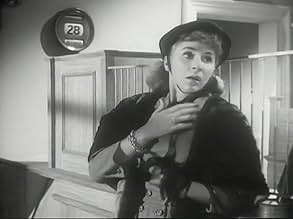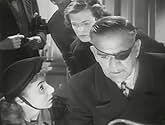Agrega una trama en tu idiomaThree episodes of "Colonel March of Scotland Yard" edited together for theatrical release.Three episodes of "Colonel March of Scotland Yard" edited together for theatrical release.Three episodes of "Colonel March of Scotland Yard" edited together for theatrical release.
- Dirección
- Guionistas
- Elenco
Patricia Owens
- Betty Hartley
- (material de archivo)
Dana Wynter
- Francine Rapport
- (as Dagmar Wynter)
Peter Butterworth
- Bank clerk
- (sin créditos)
Cy Endfield
- Man leaving British Museum library
- (sin créditos)
Pat Hagan
- Police Constable at Bank
- (sin créditos)
Victor Harrington
- Customer in Bank
- (sin créditos)
- Dirección
- Guionistas
- Todo el elenco y el equipo
- Producción, taquilla y más en IMDbPro
Opiniones destacadas
Boris Karloff in the persona of the eyed-patched, erudite March, offers three mysteries from his office in Scotland Yard, the Bureau of Queer Complaints.
It's three episodes of what would become Colonel March of Scotland Yard, shot as pilots for the prospective series, and then strung together for theatrical release. The BBC was distinctly uninterested, until ITV was approved, whereupon the powers there decided they needed something to compete with the awful thing, whereupon they commissioned twenty-six episodes. Karloff is charming and intelligent, aspects he was rarely called upon to present in the movies, although they showed up in some of his television appearances. Stardom is just as confining as the typecasting of supporting players, and while Karloff the Object of Terror was something that could be sold to movie audiences based on his corpus of work, performances such as this would have confused them. It's a pity, because with the death of C. Aubrey Smith in 1948, this shows that Karloff could have taken over the role of the gruff but kindly, aristocratic exemplar of the Empire. But why pay the premium that Karloff commanded as a horror icon, only to confuse and upset the moviegoer?
It's three episodes of what would become Colonel March of Scotland Yard, shot as pilots for the prospective series, and then strung together for theatrical release. The BBC was distinctly uninterested, until ITV was approved, whereupon the powers there decided they needed something to compete with the awful thing, whereupon they commissioned twenty-six episodes. Karloff is charming and intelligent, aspects he was rarely called upon to present in the movies, although they showed up in some of his television appearances. Stardom is just as confining as the typecasting of supporting players, and while Karloff the Object of Terror was something that could be sold to movie audiences based on his corpus of work, performances such as this would have confused them. It's a pity, because with the death of C. Aubrey Smith in 1948, this shows that Karloff could have taken over the role of the gruff but kindly, aristocratic exemplar of the Empire. But why pay the premium that Karloff commanded as a horror icon, only to confuse and upset the moviegoer?
Blacklisted Hollywood director Cy Endfield was given sanctuary at Nettlefold Studos in the early fifties by producer Hannah Weinstein directing these three pilot episodes for a TV series cobbled together into a rather hectic feature film starring a dashing-looking Boris Karloff sporting an eyepatch as he stumbled across a succession of bizarre crimes as John Dickson Carr's Colonel March of Scotland Yard.
(Years later, two of the cast, John Hewer and Sheila Burrell, became famous in add campaigns; John Hewer (now bearded) as Captain Birdseye and Sheila Burrell as the little old lady dismayed to discover her local bank is now "a trendy wine bar".)
(Years later, two of the cast, John Hewer and Sheila Burrell, became famous in add campaigns; John Hewer (now bearded) as Captain Birdseye and Sheila Burrell as the little old lady dismayed to discover her local bank is now "a trendy wine bar".)
American-financed but shot in London, COLONEL MARCH OF Scotland YARD was a short-lived 1950s-era TV series starring Boris Karloff as a detective in charge of Department 3 at Scotland Yard - a department commonly nicknamed 'The Department of Queer Complaints'. It's a period-era X-FILES, with Karloff investigating various supernaturally-tinged crimes.
This film version is an anthology of three episodes from the show, all of them featuring a typically imposing Karloff as the eyepatch-sporting hero. It's always great to see the genial Karloff playing the hero for a change, and his gruff charm adds immeasurably to the pleasure of this otherwise rather ordinary little anthology. My main disappointment with COLONEL MARCH INVESTIGATES is that the supernatural stuff is kept distinctly limited in favour of the more ordinary explanation.
The first story, HOT MONEY, is about a bank robbery in which the loot vanishes; it's short and snappy, and worth seeing for Joan Sims, impossibly young and playing a lawyer's secretary. The second story, DEATH IN THE DRESSING ROOM, has some fun in the form of exotic dance and the atmospheric nightclub scenes, and features the lovely Dana Wynter alongside an on-form Richard Wattis, cast against type. The third story, THE NEW INVISIBLE MAN, sounds great but is in fact the least, a simple tale with a simple twist. Still, these are great fun for the era, and it's worth seeing for Karloff alone.
This film version is an anthology of three episodes from the show, all of them featuring a typically imposing Karloff as the eyepatch-sporting hero. It's always great to see the genial Karloff playing the hero for a change, and his gruff charm adds immeasurably to the pleasure of this otherwise rather ordinary little anthology. My main disappointment with COLONEL MARCH INVESTIGATES is that the supernatural stuff is kept distinctly limited in favour of the more ordinary explanation.
The first story, HOT MONEY, is about a bank robbery in which the loot vanishes; it's short and snappy, and worth seeing for Joan Sims, impossibly young and playing a lawyer's secretary. The second story, DEATH IN THE DRESSING ROOM, has some fun in the form of exotic dance and the atmospheric nightclub scenes, and features the lovely Dana Wynter alongside an on-form Richard Wattis, cast against type. The third story, THE NEW INVISIBLE MAN, sounds great but is in fact the least, a simple tale with a simple twist. Still, these are great fun for the era, and it's worth seeing for Karloff alone.
Boris Karloff heads a secret Scotland Yard dept (the Department of Queer Complaints - don't think they'd call it that today), which investigates mysteries - always crime, sometimes seemingly supernatural (a little like an early forerunner of Jonathan Creek). This movie contains three stories, edited together from the first three episodes of the Colonel March of Scotland Yard 1952 UK TV series, for a theatrical release; 'Hot Money', 'Death in the Dressing Room', and 'The New Invisible Man'. Nice to spot the old TV faces, Karloff is fun to watch as always, and the solutions are pretty clever. 6.5/10.
Colonel March investigates three cases, the first a bank robbery, in which a mask wearing gunman gets away with a haul of cash, killing someone in the process.
In the second case, March is at night club where a Javanese dancer killed, and in the third March deals with a man who's convinced he's witnessed a murder through his binoculars.
Boris Karloff is great as Colonel March, an eye patch wearing, straight talking Detective, who often talks directly to the camera.
March establishes exactly what happens as 'The Department for Queer complaints,' he deals with some of the more unusual crimes, locked room mysteries as it were.
Some years ago, I worked my way through Thr Colonel March series, and for its time, I always felt it was somewhat ahead of its time, it really has that feeling of a 1950's American TV series, but of course it's set in The UK, with a largely British cast.
The three cases flow fairly well together, it doesn't feel cobbled together at any point. If you can access the TV series, I'd recommend it, as a few of the cases are very interesting.
Watch out for several well known faces, you'll see Ronald Leigh Hunt, Joan Sims, Richard Wattis, Sheila Burrell and more.
It's definitely worth a look.
7/10.
In the second case, March is at night club where a Javanese dancer killed, and in the third March deals with a man who's convinced he's witnessed a murder through his binoculars.
Boris Karloff is great as Colonel March, an eye patch wearing, straight talking Detective, who often talks directly to the camera.
March establishes exactly what happens as 'The Department for Queer complaints,' he deals with some of the more unusual crimes, locked room mysteries as it were.
Some years ago, I worked my way through Thr Colonel March series, and for its time, I always felt it was somewhat ahead of its time, it really has that feeling of a 1950's American TV series, but of course it's set in The UK, with a largely British cast.
The three cases flow fairly well together, it doesn't feel cobbled together at any point. If you can access the TV series, I'd recommend it, as a few of the cases are very interesting.
Watch out for several well known faces, you'll see Ronald Leigh Hunt, Joan Sims, Richard Wattis, Sheila Burrell and more.
It's definitely worth a look.
7/10.
¿Sabías que…?
- TriviaA pilot comprising three stories which would become episodes of the TV series 'Colonel March of Scotland Yard', filmed in the Autumn of 1952 at Nettlefold Studios: "Hot Money (1956)," "Death in the Dressing Room (1956)," and "The New Invisible Man (1956)."
- ErroresIn the final segment, 'The New Invisible Man', Major Rodman is kept in the police station. It is not clear who, therefore, has lit the fire in his sitting room, and kept it blazing all day.
- Citas
Insp. Ames: The radiator! Now why didn't I think of that?
Col. March: My dear Ames. Please don't embarrass us both by forcing me to answer that question.
- Créditos curiososOpening credits prologue: LONDON
- ConexionesEdited from Colonel March of Scotland Yard (1954)
Selecciones populares
Inicia sesión para calificar y agrega a la lista de videos para obtener recomendaciones personalizadas
Detalles
- Fecha de lanzamiento
- País de origen
- Idioma
- También se conoce como
- The Department of Queer Complaints
- Locaciones de filmación
- 140 Kings Road, Chelsea, Londres, Inglaterra, Reino Unido(exterior Barclays Bank)
- Productora
- Ver más créditos de la compañía en IMDbPro
- Tiempo de ejecución1 hora 10 minutos
- Color
- Relación de aspecto
- 1.37 : 1
Contribuir a esta página
Sugiere una edición o agrega el contenido que falta

Principales brechas de datos
By what name was Colonel March Investigates (1953) officially released in Canada in English?
Responda
